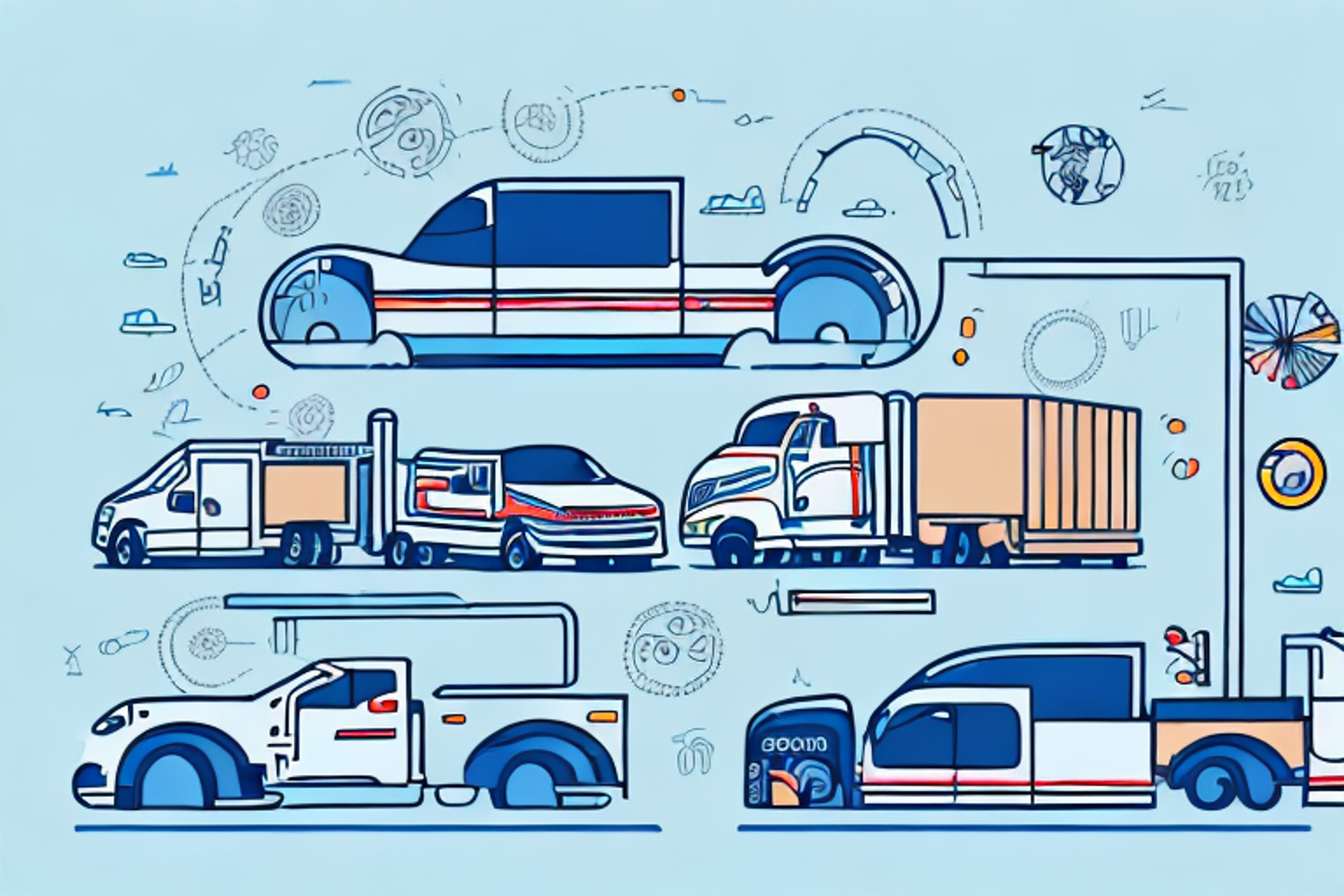The Key Factors Benchmark Considers for Transportation Startups
If you're looking to start a transportation company, it's important to understand the key factors that Benchmark considers.
Posted June 13, 2025

Join a free event
Learn from top coaches and industry experts in live, interactive sessions you can join for free.
Table of Contents
In today's rapidly evolving startup landscape, the transportation industry has become an attractive space for innovative entrepreneurs looking to break into new markets. With the rise of on-demand delivery services, ride-sharing platforms, and autonomous vehicles, the transportation sector is ripe with opportunities for disruption and growth.
Introduction to the Transportation Startup Industry
Transportation startups refer to businesses that offer innovative solutions to transportation-related challenges in the industry. These challenges include last-mile delivery, reducing traffic congestions, and improving safety measures.
One of the most significant challenges that transportation startups face is the lack of infrastructure. Many cities and towns do not have the necessary infrastructure to support new transportation technologies, such as electric vehicles and autonomous cars. This lack of infrastructure can hinder the growth of transportation startups and limit their ability to provide their services to a wider audience.
Another challenge that transportation startups face is the regulatory environment. The transportation industry is heavily regulated, and startups must comply with a range of regulations and laws to operate legally. This can be a significant barrier to entry for new startups, as compliance can be time-consuming and expensive.
The Importance of Benchmarking in the Transportation Startup Industry
Benchmarking is a crucial step for transportation startups to measure their performance against other leaders in the industry and identify areas for improvement. The transportation industry is highly competitive, benchmarking sets startups on a path to success by analyzing and comparing business practices to other industry leaders.
One of the key benefits of benchmarking is that it allows transportation startups to gain insights into the latest industry trends and best practices. By analyzing the strategies and tactics of successful companies, startups can identify new opportunities for growth and innovation. This can help them stay ahead of the curve and remain competitive in a rapidly evolving industry.
Another advantage of benchmarking is that it can help transportation startups build stronger relationships with their customers. By studying the customer service practices of top-performing companies, startups can learn how to better meet the needs and expectations of their own customers. This can lead to increased customer satisfaction, loyalty, and ultimately, revenue growth.
Understanding the Key Factors Considered by Benchmark for Transportation Startups
The key factors considered by benchmark for transportation startups include analyzing the market demand, identifying target audience, evaluating the business model, assessing the financial health of a company, creating a sustainable competitive advantage, building a strong brand identity, developing effective marketing strategies, leveraging technology, and navigating legal and regulatory compliance.
One of the most important factors that transportation startups need to consider is the environmental impact of their operations. With the increasing concern for climate change and sustainability, consumers are becoming more conscious of the carbon footprint of the products and services they use. Transportation startups that prioritize eco-friendliness and implement sustainable practices in their operations are likely to gain a competitive advantage in the market.
Another key factor that transportation startups need to focus on is customer experience. In today's digital age, consumers expect convenience, speed, and reliability in their transportation services. Startups that prioritize customer satisfaction and invest in user-friendly technology solutions are more likely to succeed in the long run.
Analyzing the Market Demand for Transportation Startups
It is crucial for transportation startups to analyze the market demand before launching any new business. Analyzing the market demand allows startups to identify shifting trends, gaps in the market, and opportunities for innovation. This analysis provides a solid foundation to make critical decisions that impact profitability and growth.
One important aspect of analyzing market demand is understanding the needs and preferences of potential customers. This can be done through market research, surveys, and focus groups. By gathering this information, transportation startups can tailor their services to meet the specific needs of their target audience, which can lead to increased customer satisfaction and loyalty.
Another factor to consider when analyzing market demand is the competitive landscape. Transportation startups need to be aware of their competitors and their offerings, as well as any potential new entrants to the market. This information can help startups differentiate themselves and identify areas where they can offer unique value to customers.
Identifying Your Target Audience in the Transportation Startup Industry
Identifying a target audience allows transportation startups to tailor their services to their most profitable customers. By understanding who their ideal customers are, startups can create marketing messages that resonate with them, building strong brand loyalty.
One effective way to identify your target audience is by conducting market research. This can involve analyzing demographic data, such as age, gender, income, and location, to determine who is most likely to use your transportation services. Additionally, gathering feedback from current customers can provide valuable insights into their needs and preferences, allowing startups to make informed decisions about product development and marketing strategies.
Evaluating Your Business Model for Success in the Transportation Startup Industry
Evaluating the business model is a vital step for transportation startups to achieve sustained success. An effective business model takes into account factors such as cost structure, revenue streams, and value proposition. By evaluating the business model regularly, transportation startups can identify areas of improvement and adapt quickly to changing market demands.
One important aspect of evaluating the business model is analyzing the competition. Transportation startups need to understand their competitors' strengths and weaknesses, as well as their own unique selling points. This information can help them refine their business model and differentiate themselves in the market.
Another factor to consider when evaluating the business model is the regulatory environment. Transportation startups need to be aware of any regulations that may impact their operations, such as licensing requirements or safety standards. By staying up-to-date on regulatory changes, transportation startups can ensure compliance and avoid costly penalties.
Assessing Your Company's Financial Health and Viability
Assessing a company's financial health and viability involves regularly analyzing financial statements, cash flow, and profitability metrics. Doing this allows transportation startups to make informed decisions on investments in new technology, marketing initiatives, and growth opportunities.
It is important to note that financial health and viability are not only determined by numbers and metrics. Factors such as market trends, competition, and regulatory changes can also impact a company's financial standing. Therefore, it is crucial for transportation startups to stay up-to-date on industry news and developments, and to adapt their strategies accordingly.
Creating a Sustainable Competitive Advantage in the Transportation Startup Industry
Creating a sustainable competitive advantage allows transportation startups to remain relevant in an increasingly competitive marketplace. This process involves understanding the company's unique offerings and creating a business strategy that leverages these offerings to stand out to consumers.
One way to create a sustainable competitive advantage in the transportation startup industry is to focus on innovation. By constantly innovating and improving upon existing products and services, transportation startups can differentiate themselves from competitors and attract customers who are looking for the latest and greatest technology.
Another important factor in creating a sustainable competitive advantage is building strong relationships with customers. By providing excellent customer service and building a loyal customer base, transportation startups can create a strong brand reputation that sets them apart from competitors and helps them to maintain a competitive edge over time.
Building a Strong Brand Identity for Your Transportation Startup
Building a strong brand identity involves creating a unique and compelling narrative that resonates with customers. Strong brand identities allow transportation startups to carve out a unique position in the marketplace and drive customer loyalty.
One important aspect of building a strong brand identity for your transportation startup is to establish a consistent visual identity. This includes creating a logo, choosing a color scheme, and selecting fonts that reflect your brand's personality and values. Consistency in visual identity helps customers recognize and remember your brand.
Another key element of building a strong brand identity is to focus on customer experience. This means understanding your customers' needs and preferences and tailoring your services to meet those needs. By providing exceptional customer service and creating a positive experience for your customers, you can build a strong reputation and increase customer loyalty.
Developing Effective Marketing Strategies for Transportation Startups
Developing effective marketing strategies allows transportation startups to reach new customers, drive engagement, and strengthen brand identity. By investing in digital marketing initiatives such as social media, content marketing, and SEO, transportation startups can connect with customers and build a strong online presence.
Leveraging Technology to Drive Innovation and Growth in the Transportation Startup Industry
Leveraging technology to drive innovation and growth is critical for transportation startups looking to remain competitive. By investing in new technology such as self-driving cars and IoT devices, transportation startups can streamline operations, reduce costs, and offer innovative solutions for customers.
Navigating Legal and Regulatory Compliance in the Transportation Startup Industry
Navigating legal and regulatory compliance is vital for transportation startups to ensure that they operate within the law and minimize the risk of legal challenges. This involves understanding the local laws, regulations, and guidelines in the target market, and developing a compliance program to ensure all business operations adhere to these requirements.
Conclusion: Tips for Success in the Competitive World of Transportation Startups
In the world of transportation startups, success is achieved by identifying trends, leveraging technology, building a strong brand identity, and constantly adapting to change. By following these steps, and regular benchmarking, transportation startups can achieve sustained growth in an increasingly competitive industry.
Browse hundreds of expert coaches
Leland coaches have helped thousands of people achieve their goals. A dedicated mentor can make all the difference.



















